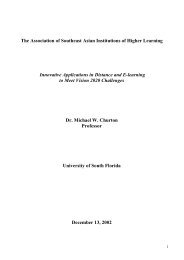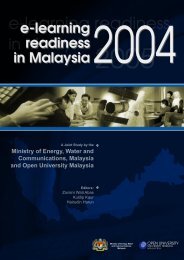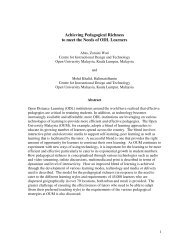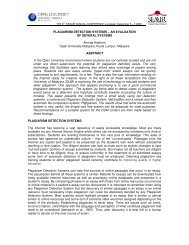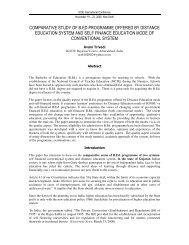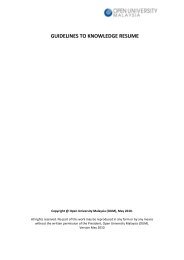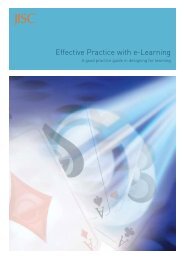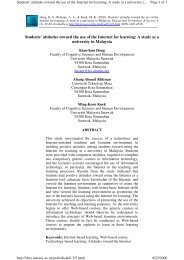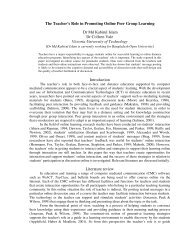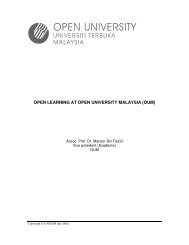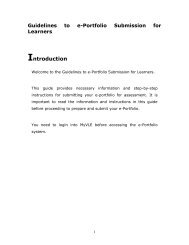lifelong learning and distance higher education - Asia Pacific Region
lifelong learning and distance higher education - Asia Pacific Region
lifelong learning and distance higher education - Asia Pacific Region
- No tags were found...
Create successful ePaper yourself
Turn your PDF publications into a flip-book with our unique Google optimized e-Paper software.
The term modern <strong>distance</strong> <strong>education</strong> (MDE) means the provision of ICT-based <strong>distance</strong><strong>education</strong> using multimedia computer facilities <strong>and</strong> the Internet as the core technologiesfor off-campus learners. The term e-<strong>learning</strong> refers to the integration of ICT withcurriculum reform <strong>and</strong> pedagogical innovation in teaching <strong>and</strong> <strong>learning</strong> for all sectorsof formal <strong>education</strong>, continuing <strong>education</strong>, in-service training <strong>and</strong> <strong>lifelong</strong> <strong>learning</strong>. Theterm online <strong>education</strong> college (OEC) designates a college providing MDE programmesattached to campus-based universities.Figure 6.1: Basic structure of a <strong>lifelong</strong> <strong>education</strong> system within a <strong>learning</strong> societyModern Education System with Chinese CharacteristicsNATIONALEDUCATIONSYSTEMDE programmesfor off-campuslearnersLIFELONGEDUCATIONSYSTEMInformation <strong>and</strong> Learning Society with Knowledge-based EconomyMDE can be considered the latest of three phases in the Chinese system of <strong>distance</strong> HE.In the first phase starting in the early 1950s, DE was by correspondence; from the 1960sradio <strong>and</strong> television began to be used; <strong>and</strong> the end of the 1990s saw the beginning of theuse of ICT including Internet in HE. HE is one of the areas that are being affected by thenew technology – including, of course, <strong>distance</strong> HE for the <strong>lifelong</strong> learner. At present,due to a shortage of <strong>education</strong> resources, only about 10 per cent of school-leavers canbe enrolled in colleges or universities (DDP of MoE, 2003), <strong>and</strong> consequently thereis intense competition for university places. For mature students wishing to study fordegrees or diplomas, the opportunities are even more limited. In this situation MDEis believed to be a fast <strong>and</strong> cost-effective way to ease the pressure (Ding, 1994, 1995,1999a).As China proceeds to develop its capacities in this area, it has assigned a central steering<strong>and</strong> co-ordinating role to the state. Over the past few decades strategic guidelines for<strong>education</strong>al reform <strong>and</strong> development in China have been formulated at various politicallevels from the Central Committee of the Communist Party of China (CCoCPC)downwards, with the MoE having a key function in the process. For example, theAction Plan for Invigorating Education towards the Twenty-First Century (1998–2002)formulated by the MoE (MoE, 1998) pointed out that “extensive use of moderninformation technology in <strong>education</strong> will engender profound changes in the <strong>education</strong>alsector, <strong>and</strong> <strong>lifelong</strong> <strong>education</strong> will be a requisite condition for both <strong>education</strong>aldevelopment <strong>and</strong> socia1 progress…”. The Decision made by the CCoCPC <strong>and</strong> the StateCouncil (SC) (Chinese central government) at the Third National Meeting on Educationin 1999 (CCoCPC & SC, 1999) reconfirmed that more importance should be attached toMDE. It should be thoroughly modernised, <strong>and</strong> the use of ICT in <strong>education</strong> should alsobe promoted (Ding, 1999b, 2001a).The government thus plays an overseeing <strong>and</strong> co-ordinating role, setting the overallguidelines <strong>and</strong> priorities for <strong>education</strong>al policy-making <strong>and</strong> striving to ensure that64



